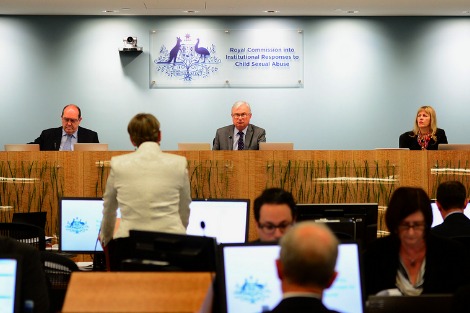 Last week I went to the Royal Commission and had a private session, which means, in short, that I am a victim of sexual abuse. That history spanned nearly three decades. My encounters with one perpetrator prepared me for more harrowing experiences during adolescence, and later in a marriage that turned violent. Those crimes have shaped my life, and telling my tale that spans nearly 50 years was an experience for which I am thankful.
Last week I went to the Royal Commission and had a private session, which means, in short, that I am a victim of sexual abuse. That history spanned nearly three decades. My encounters with one perpetrator prepared me for more harrowing experiences during adolescence, and later in a marriage that turned violent. Those crimes have shaped my life, and telling my tale that spans nearly 50 years was an experience for which I am thankful.
I commend the Royal Commission for the way in which it was conducted; with attentiveness, sensitivity and professionalism, and with an ongoing concern for the wellbeing of the interviewee.
During the process, it was mentioned that after the Commission had finished its work, there might be the possibility of making this process available to those who might subsequently want to recount stories of sexual abuse. I think that could be a valuable option, but it set me thinking about the whole process of dealing with this crime, the wounds, and the tragedy.
First I want to say that we are very well served by a judicial system in our democracy which takes seriously the sexual crimes against the most vulnerable. This independent body, which is separate from executive and legislative bodies in our society, is fundamental to protecting the rights of individuals. This system is not available in the Catholic Church, with these three bodies being collapsed into the role of bishop. Perhaps this is one of the reasons why the Church has had so much difficulty with dealing with this crime.
While I do not in any way want to undermine the judicial system, I would like to offer some alternative thinking. The judiciary is, in effect, a hierarchy. A victim can find comfort in that powerful system. Justice can be delivered for crimes committed. But at the end of the proceedings, the victim is still a victim. One's status has not changed. As for the perpetrator, that label will probably remain with them for the rest of their life, and even after death.
While those labels may well describe those involved, I am worried that at some point they become stereotypes. People are categorised by them in perpetuity. In this system, there is no closure for either the victim or the perpetrator. And what is further communicated is that sexual abuse is the sum total of a person's life.
Are there other ways? I think one possibility is that of restorative justice. This approach might be a way for some, not all, and it should not be looked upon as mitigating criminality. But restorative justice might provide an opportunity to recalibrate the experience of sexual abuse. With the facilitation of a skilled mediator, the victim and the perpetrator have the opportunity to evaluate the assault/s and its consequences. In this approach, the mere fact of the 'victim' no longer being in a subordinate position to the 'perpetrator' reconfigures their relationship.
Further, both the 'victim' and the 'perpetrator' are compelled to find within themselves the motivation and ability to deal with what has happened. If this process is carried out skilfully and compassionately, and the two individuals are able and open to the challenge of this encounter, then this surely must contribute to personal development. Prior experiences including memories and images, feeling and thoughts, are reassessed. The previous understanding is now replaced with a new understanding of what has happened.
In effect, there is a possibility that the 'victim' can be re-empowered, which is certainly a contradiction to what happened during the assault/s. Likewise, the 'perpetrator' can reappropriate their crime, dependent on their ability to make some tough decisions. There are no guarantees, but restorative justice has the potential to change one's understanding of self and the meaning of life. For some, that may mean closure. One can move on with one's life, because an empowered (and courageous) individual is more than the sum of a crime.
There is another option that might also be considered, and that is ritual. Ritual, especially religious ritual can be a very powerful experience. Done well, it can touch areas where psychology and law cannot. Is there a ritual where people can be purified from this blot on their life? Can we enter into this liminal space, this wild and challenging place, and, then, transition anew? Ritual does this for so many of life's transitions, surely there are one or more rituals that might be made available.
There is much more thinking to be done on how we as a society might interrupt this crime of sexual abuse. For instance, the way we sexualise identity in religious and society has to be addressed. We are more than the sum of our biology and sexual physicality. We are made for intimate, mutual, wholesome and loving relationships. We are complex individuals. In addressing these crimes, surely it is a goal for which all could aspire, and one to which the Royal Commission brings us a little closer.
 Dr Jane Anderson is an anthropologist and Honorary Research Fellow at University of Western Australia. She is currently writing up her research on progressive Catholicism. She is the author of Priests in Love: Australian Catholic Clergy and Their Intimate Friendships and Souled Out: Power and Protest in a Catholic Parish.
Dr Jane Anderson is an anthropologist and Honorary Research Fellow at University of Western Australia. She is currently writing up her research on progressive Catholicism. She is the author of Priests in Love: Australian Catholic Clergy and Their Intimate Friendships and Souled Out: Power and Protest in a Catholic Parish.